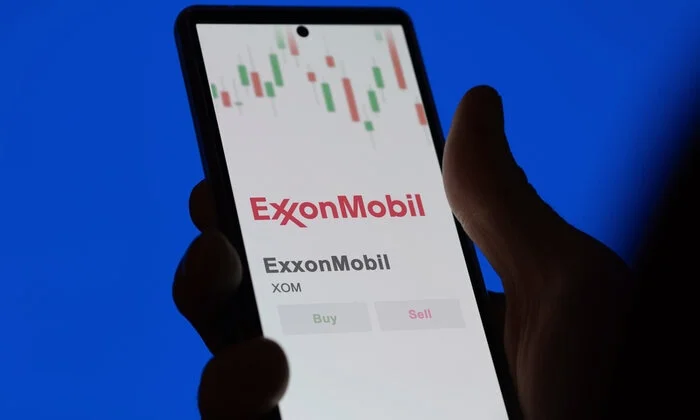So Exxon Mobil had a "good" quarter. At least, that's the story they’re trying to sell. They beat Wall Street’s earnings-per-share estimates by a few pennies, and the corporate press dutifully typed it up. The stock, of course, immediately slipped.
Give me a break.
This whole song and dance is the perfect little microcosm of everything wrong with financial news. It’s a shell game designed to manage perceptions, not reflect reality. We’re all supposed to stand up and applaud because a multi-hundred-billion-dollar behemoth managed to squeeze out $1.88 a share when the geniuses in suits were only expecting $1.82. Never mind that actual revenue missed by over a billion dollars. Never mind that profit fell by more than a billion from a year ago.
No, no, just look at the shiny little EPS number. Ignore the man behind the curtain who’s frantically trying to patch the holes in a sinking ship. This isn't an earnings beat; it's a magic trick. And frankly, it's insulting.
Let’s get into the spin, because it’s truly a work of art. CEO Darren Woods, with what I can only imagine was a perfectly straight face, said, “We delivered the highest earnings per share we’ve had compared to other quarters in a similar oil-price environment.”
Read that again. It’s like a student bragging they got the highest C-minus in a class where everyone else failed. It’s a statement completely devoid of any real meaning, a PR-crafted sentence designed to sound impressive while admitting things are, you know, not great. He’s basically telling investors, "Hey, for a world where our main product is worth less, we're doing a fantastic job of not completely collapsing!"

And what’s their grand strategy to deal with these lower prices? Pump more oil. A lot more. This is how you get headlines proclaiming that Exxon earnings beat as production in Guyana, Permian soar to records despite low oil prices. Production is up to nearly 4.8 million barrels a day. This is the corporate equivalent of discovering you have a leak in your boat and deciding the best solution is to start bailing with a bigger bucket, instead of, say, plugging the damn hole. It’s a brute-force solution that helps the top-line number look a little less anemic, but does it solve the fundamental problem? What happens if prices keep sliding and they're just flooding an already saturated market?
This is just classic corporate thinking. No, 'classic' is too generous—it’s a calculated, short-sighted maneuver. The entire system is built on hitting these quarterly targets, so the managment team will pull whatever lever they can to make the numbers work for the next 90 days, even if it sets them up for a bigger problem down the road. Then again, maybe I'm the crazy one here. Maybe this is some 4D chess move I'm too simple to understand. But I doubt it.
Trying to dig into this stuff is a nightmare in its own right. You click a link for an earnings report and what do you get? "Access to this page has been denied." Why? Because their system thinks my browser is a rogue AI, apparently. You click another link, and instead of financial data, you're hit with a 2,000-word treatise on NBCUniversal’s cookie policy.
I’m not kidding. I was trying to figure out Exxon’s capital expenditure and I ended up reading about "Strictly Necessary Cookies," "Flash Local Storage," and my glorious opt-out rights under the "Australian Digital Advertising Alliance." It’s an information superhighway filled with roadblocks and billboards for things you never asked for. This whole ecosystem ain't built to inform you. It’s built to track you, monetize you, and wear you down until you just accept the headline and move on.
It’s all just noise. Layers and layers of corporate and digital nonsense designed to obscure a simple truth. And the truth is that the market looked at Exxon’s "beat" and saw exactly what it was: a company running faster just to stay in the same place. Wall Street’s official consensus, offcourse, is a "Moderate Buy." It’s the most meaningless, cover-your-ass rating in the business. It’s the participation trophy of financial analysis, a way of saying "we have no idea, but we don't want to look stupid if it goes up."
They see a company whose profits are falling, whose margins are getting squeezed, and whose only answer is to pump more of a product that's losing value. And they say, "Yeah, looks moderately good to us." And we're supposed to take these people seriously? The whole thing is a joke, and the punchline is always on the retail investor. They get you focused on the EPS number, the analyst ratings, the PR spin... and the whole time, the actual foundation is quietly eroding.
Forget the earnings per share. Forget the revenue beat or miss. None of it matters. The only thing that matters is that Exxon is a giant in an industry facing a fundamental crisis of value, and its only response is to do more of the same thing that’s causing the problem. This "beat" was nothing more than a fresh coat of paint on a rusty machine. Don't let the headlines fool you; the market didn't.